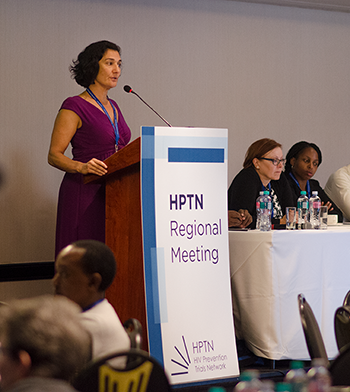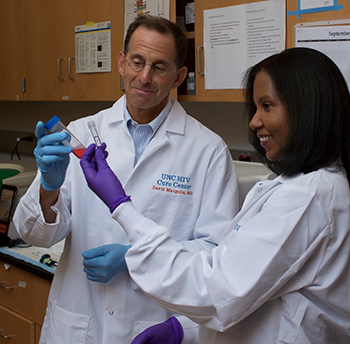Mina Hosseinipour
 Women compromised 59 percent of adults living with HIV in sub-Saharan Africa in 2014 according to the World Health Organization. Creating HIV prevention efforts that target women is critical to stopping new infections. Mina Hosseinipour, MD, MPH, is scientific director of UNC Project-Malawi in Lilongwe, Malawi, and a professor of medicine at UNC. She is co-chair of the first large-scale clinical trial of a long-acting injection to prevent HIV in women.
Women compromised 59 percent of adults living with HIV in sub-Saharan Africa in 2014 according to the World Health Organization. Creating HIV prevention efforts that target women is critical to stopping new infections. Mina Hosseinipour, MD, MPH, is scientific director of UNC Project-Malawi in Lilongwe, Malawi, and a professor of medicine at UNC. She is co-chair of the first large-scale clinical trial of a long-acting injection to prevent HIV in women.
The study in southern and eastern Africa will examine whether a long-acting form of cabotegravir injected once every eight weeks can safely protect women at risk for HIV. The National Institutes of Health-funded HIV Prevention Trials Network (HPTN) is conducting the study, which is called HPTN 084.
“HPTN 084 will examine how women experience long-acting injectable cabotegravir – whether they find it desirable and usable,” said Hosseinipour. “Understanding what types of HIV prevention fit best in women’s lives will help further refine HIV prevention research, delivering tools that are ultimately safe, effective and desired.”
The trial will enroll approximately 3,200 sexually active women aged 18 to 45 years at 20 sites in seven countries in southern and eastern Africa. The women will be randomly assigned to either the cabotegravir group or the Truvada group. Truvada is the only drug regimen currently licensed for HIV pre-exposure prophylaxis, or PrEP. Neither the participants nor the study team will know who is in which group until the end of the trial. Participants will be in the study for an average of 3.6 years.
Myron Cohen and Cindy Gay
 The next frontier of HIV prevention is broadly neutralizing antibodies or bnAbs.
The next frontier of HIV prevention is broadly neutralizing antibodies or bnAbs.
The idea for preventing HIV by giving people an infusion of antibodies grew out of a patient story in Africa. A patient living with HIV in Malawi began producing HIV antibodies within a year of being infected – a rare phenomenon.
The case got researchers thinking about antibodies and HIV prevention – instead of giving someone a vaccine researchers hoped prompted the person to produce antibodies, what if you just gave them the antibodies? Researchers began testing the idea of using VRC01, a broadly neutralizing monoclonal antibody, to prevent HIV. In tested samples, the antibody kills as much as 91 percent of HIV strains.
This led to the creation of the Antibody Mediated Prevention (AMP) study. The AMP study will continue testing using VRC01 in patients. Participants in the study will be given an intravenous infusion of the VRC01 antibody or a placebo 10 times, once every eight weeks. The study is being conducted by two NIH-funded HIV research networks – the HIV Vaccine Trials Network (HVTN) and the HIV Prevention Trials Network (HPTN). UNC’s Myron Cohen, MD, is co-chair of the HPTN and Cindy Gay, MD, MPH, is the principal investigator for the UNC study site. Both Cohen and Gay along with an AMP study participant were recently interviewed by WRAL.
Men who have sex with men, transgender women, and transgender men who have sex with men are eligible for the study. AMP is being conducted in North America, South America and Africa.
David Margolis and Nancie Archin
 A major challenge to curing HIV is the virus’s ability to lay dormant in the body. UNC HIV researchers David Margolis, MD, and Nancie Archin, PhD, have been testing latency-reversing agents with the goal of making the virus recognizable by the immune system.
A major challenge to curing HIV is the virus’s ability to lay dormant in the body. UNC HIV researchers David Margolis, MD, and Nancie Archin, PhD, have been testing latency-reversing agents with the goal of making the virus recognizable by the immune system.
“We are learning that it will probably require more than one type of drug to reactivate latent HIV because HIV is a multifactorial — different pathways regulate HIV latencies — so we are looking at different drug combinations,” said Archin. “And we are also looking at ways to boost the immune system to make it better at killing the infected cell once it’s reactivated.”
Two novel clinical trials are ongoing at UNC, combining a drug shown to make latently infected cells vulnerable to elimination with novel immunotherapies to recognize and clear persistently infected cells.
Margolis and Archin are part of the UNC-GSK team working side-by-side in UNC HIV Cure Center. The pair were recently interviewed for a short video about cure research, along with a study participant.
Jonathan Parr
 Hepatitis C virus is a curable infectious disease, but treatment remains unavailable in resource-limited settings like the Democratic Republic of the Congo (DRC). The DRC Ministry of Health asked UNC to help determine the burden of infection and find a way to connect people infected to treatment. Using laboratory equipment readily available in developing countries, researchers from UNC and Abbott Diagnostics were able to define and map the burden of disease in the DRC.
Hepatitis C virus is a curable infectious disease, but treatment remains unavailable in resource-limited settings like the Democratic Republic of the Congo (DRC). The DRC Ministry of Health asked UNC to help determine the burden of infection and find a way to connect people infected to treatment. Using laboratory equipment readily available in developing countries, researchers from UNC and Abbott Diagnostics were able to define and map the burden of disease in the DRC.
The UNC-Abbott team adapted a common hepatitis C virus test for use with small spots of blood dried onto filter paper. The filter papers were then processed using the Abbott m2000 platform, which is widely used to detect HIV in the DRC and other countries. The researchers determined that about 1 percent or between 100,000 and 200,000 adults living in the DRC had hepatitis C.
“We developed a simple, scalable testing algorithm that can be used in the developing world where there are minimal lab capabilities,” said Jonathan Parr, MD, MPH, a member of UNC’s Infectious Disease Epidemiology and Ecology Lab (IDEEL). “We repurposed existing infrastructure, proved that the dried blood spot test worked and defined the burden of hepatitis C in the DRC.”
Parr is now part of a team that will use funds from the UNC Gillings School of Global Public Health to test two interventions to prevent mother-to-child transmission of hepatitis B virus in the DRC. Around 5 percent of people living in the DRC have hepatitis B. Mother-to-child transmission of the virus is easily preventable if proper screening and treatment are in place. Parr says there is no cure for chronic hepatitis B virus. If left untreated, it can progress to chronic liver disease and cancer.
The project will be based in antenatal clinics and hospitals in Kinshasa. Parr and colleagues will screen 2,000 women for hepatitis B virus during their antenatal visits. Women who test positive will be given medication to control their viral load, and women living with HIV will receive medications that treat both HIV and hepatitis B virus. Once an infant is born, the hepatitis B virus vaccine will be administered within 24 hours, which is standard practice in the United States. Currently in the DRC, this vaccine is given once the infant is six weeks old, which is too late to prevent infection.